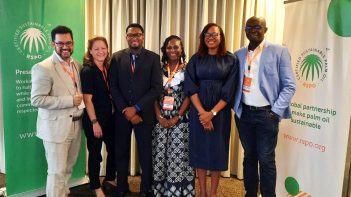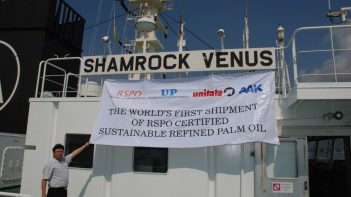KUALA LUMPUR, November 18, 2015: The Roundtable on Sustainable Palm Oil’s (RSPO) 13th Annual Roundtable Meeting (RT13) reaffirmed the commitment to drive environmental and social sustainability as corporate leaders, NGOs, policy makers and academics plan their goals for the next five years. The annual roundtable which began on 16th November at the Shangri-La Hotel in Kuala Lumpur, has been focusing its discussions on the roadmap for the industry and realignment of its plans to achieve a globally shared vision of market transformation towards sustainable palm oil.
Themed “Global Vision | Regional Action: From 2015 to 2020”, RT13 was attended by over 800 representatives from 44 different countries, enabling the stakeholders to learn more about RSPO’s latest efforts to prioritize regional uptake of 100% certified sustainable palm oil (CSPO) in the consuming markets.
“The big idea behind the theme is that while we have a shared global vision on sustainable palm oil, we need to set regional objectives for market uptake to reach 100% CSPO in Europe, 50% in Indonesia and
Malaysia, 30% in India and 10% in China by 2020,” said Datuk Darrel Webber, Secretary-General of RSPO.
Participants during the three-day conference will explore the integration of environmental and socio-economic prospects towards achieving a common goal. The conference has been addressing the current state of the industry as well as efforts by each region to bolster greater global growth in the sustainable palm oil industry. Among the key highlights during RT13 included:
- Jurisdictional certification, which showcases the landscape-level certification initiatives by Sabah, Malaysia and Central Kalimantan & South Sumatera, Indonesia in working towards ensuring that all palm oil produced in these areas are certified sustainable.
- After 4 years of discussions, the concept of Remediation and Compensation Procedures will become a reality as the RSPO Board of Governors, including Producers, Supply Chain, Financial Institutions, Social and Environmental NGO constituencies, has given its endorsement to the procedures. The RSPO welcomes this process as a long sought after potential solution to the contentious topic of addressing and remediating for land cleared without prior HCV assessment.
- Further to the last few months of discussions around legality of concession maps disclosure, the RSPO is now clear on its legal position on this issue in Indonesia and other producing nations, with the exception of Malaysia. The organisation reinforced its continuous support to members who are willing to meet the resolution agreed in the RSPO General Assembly 2013, to make maps public.
Raising awareness has been RSPO’s top priority in facilitating the alignment of both commercial entities and government leaders in respective markets, to understand the best practices and support the globally agreed environmental standards. As a highlight on the progress on new emerging markets for sustainable palm oil, the Guide for Overseas Investment and Production of Sustainable Palm Oil by Chinese Enterprises was presented to the participants for a session of public consultation.
For more information about RT13, please visit http://www.rt13.rspo.org.
About RSPO
In response to the urgent and pressing global call for sustainably-produced palm oil, the Roundtable on Sustainable Palm Oil (RSPO) was formed in 2004 with the objective of promoting the growth and use of sustainable oil palm products through credible global standards and engagement of stakeholders. The seat of the association is in Zurich, Switzerland, while the secretariat is currently based in Kuala Lumpur
with satellite offices in Jakarta, London and Zoetermeer (NL).
RSPO is a not-for-profit association that unites stakeholders from seven sectors of the palm oil industry – oil palm producers, palm oil processors or traders, consumer goods manufacturers, retailers, banks and
investors, environmental or nature conservation NGOs and social or developmental NGOs – to develop and implement global standards for sustainable palm oil.
Such multi-stakeholder representation is mirrored in the governance structure of RSPO such that seats in the Executive Board and project-level Working Groups are fairly allocated to each sector. In this way,
RSPO lives out the philosophy of the "roundtable" by giving equal rights to each stakeholder group to bring group-specific agendas to the roundtable, facilitating traditionally adversarial stakeholders and business competitors to work together towards a common objective and make decisions by consensus.
For further information, kindly contact:
Contact for RSPO:
Tanzina Rahman
Edelman
T: (+60-3) 2287-8689
Celeste Bolano
Edelman
Tel: (+60-3) 2287-8689
Keep reading

RSPO hosts first Africa downstream sustainable palm oil supply chain forum in Cape Town

Nearly two decades on, Europe continues to drive global demand for RSPO Certified Palm Oil

Communicating Sustainable Palm Oil - examples of success across Europe
[EOT] Terms of Reference: Independent Smallholders Outreach Programme in Indonesia

RT2023 Delegates Propose Solutions to Reinforce RSPO’s Assurance System – End-Year Highlights of Assurance Standing Committee
RSPO UK Members' Day Examines Shifting Dynamics of Doing Business within Europe

Celebrating 20 Years of RSPO’s Sustainability Journey




